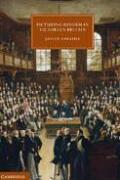
How did Victorians, as creators and viewers of images, visualize the politics of franchise reform? This study of Victorian art and parliamentary politics, specifically in the 1840s and 1860s, answers that question by viewing the First and Second Reform Acts from the perspectives offered by Ruskin’s political theories of art and Bagehot’s visual theory of politics. Combining subjects and approaches characteristic of art history, political history, literary criticism, and cultural critique, Picturing Reform in Victorian Britain treats both paintings and wood engravings, particularly those published in Punch and the Illustrated London News. Carlisle analyzes unlikely pairings - a novel by Trollope and a painting by Hayter, an engraving after Leech and a high-society portrait by Landseer - to argue that such conjunctions marked both everyday life in Victorian Britain and the nature of its visual politics as it was manifested in the myriad heterogeneous and often incongruous images of illustrated journalism.